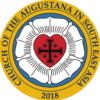Ember Friday
Liturgical Color: Violet
Introit
RE-MEM- || ber, O Lord, thy tender mercies and thy loving | kind·ness- | es:
for they have been ev- | er | of | old.
|| Unto Thee, O Lord, do I lift up my soul. O my God, I trust in | Thee | -:
let me not be ashamed, let not mine enemies triumph | ov- | er | me.
Psalm Readings
Collect
O Lord, be gracious to Thy people. and as Thou makest them devoted to Thee, in Thy mercy comfort them with Thy kind assistance, through our Lord Jesus Christ, who liveth and reigneth with Thee and the Holy Ghost, ever One God, world without end. Amen.
First Reading: Ezekiel 18:20-28
The soul who sins shall die. The son shall not bear the guilt of the father, nor the father bear the guilt of the son. The righteousness of the righteous shall be upon himself, and the wickedness of the wicked shall be upon himself. “But if a wicked man turns from all his sins which he has committed, keeps all My statutes, and does what is lawful and right, he shall surely live; he shall not die. None of the transgressions which he has committed shall be remembered against him; because of the righteousness which he has done, he shall live. Do I have any pleasure at all that the wicked should die?” says the Lord God , “and not that he should turn from his ways and live? “But when a righteous man turns away from his righteousness and commits iniquity, and does according to all the abominations that the wicked man does, shall he live? All the righteousness which he has done shall not be remembered; because of the unfaithfulness of which he is guilty and the sin which he has committed, because of them he shall die. “Yet you say, ‘The way of the Lord is not fair.’ Hear now, O house of Israel, is it not My way which is fair, and your ways which are not fair? When a righteous man turns away from his righteousness, commits iniquity, and dies in it, it is because of the iniquity which he has done that he dies. Again, when a wicked man turns away from the wickedness which he committed, and does what is lawful and right, he preserves himself alive. Because he considers and turns away from all the transgressions which he committed, he shall surely live; he shall not die.
Gradual
|| Give ear, O Lord, unto my prayer; and attend to the voice of my suppli- | ca- | tions:
O Thou my God, save Thy servant that trust- | eth | in | Thee.
Second Reading: John 5:1-15
5 After this there was a feast of the Jews, and Jesus went up to Jerusalem. Now there is in Jerusalem by the Sheep Gate a pool, which is called in Hebrew, Bethesda, having five porches. In these lay a great multitude of sick people, blind, lame, paralyzed, waiting for the moving of the water. For an angel went down at a certain time into the pool and stirred up the water; then whoever stepped in first, after the stirring of the water, was made well of whatever disease he had. Now a certain man was there who had an infirmity thirty-eight years. When Jesus saw him lying there, and knew that he already had been in that condition a long time, He said to him, “Do you want to be made well?” The sick man answered Him, “Sir, I have no man to put me into the pool when the water is stirred up; but while I am coming, another steps down before me.” Jesus said to him, “Rise, take up your bed and walk.” And immediately the man was made well, took up his bed, and walked. And that day was the Sabbath. The Jews therefore said to him who was cured, “It is the Sabbath; it is not lawful for you to carry your bed.” He answered them, “He who made me well said to me, ‘Take up your bed and walk.’ ” Then they asked him, “Who is the Man who said to you, ‘Take up your bed and walk’ ?” But the one who was healed did not know who it was, for Jesus had withdrawn, a multitude being in that place. Afterward Jesus found him in the temple, and said to him, “See, you have been made well. Sin no more, lest a worse thing come upon you.” The man departed and told the Jews that it was Jesus who had made him well.
Devotion from the Lutheran Herald
Scripture taken from the New King James Version®. Copyright © 1982 by Thomas Nelson. Used by permission. All rights reserved.
